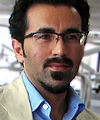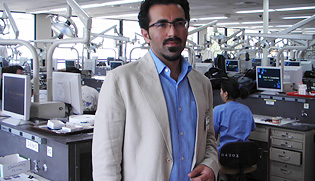
Sohail Ebrahimi
When Sohail Ebrahimi first applied to dental school, he was turned down, and his dream of becoming a dentist seemed to be slipping away.
But then he learned of the UCSF School of Dentistry's Post-Baccalaureate Program, a one-year program that gives disadvantaged students with a demonstrated desire to work in underserved communities a second chance.
Today, the UCSF dental school graduate has a thriving, predominantly Afghani dentistry practice in Union City. "The program helped to make my dream come true," said Ebrahimi, who now also teaches part time in the school.
Ebrahimi, who graduated from high school in nearby Fremont, said he was more than happy to return to the East Bay area to set up his practice. "It's nice for me to help my community and my people," he said. Many of his patients are elderly and don't speak English. "I understand them. I know their needs. They can talk to me without the third person present," he said.
Ebrahimi is part of the solution to a growing workforce shortage problem in modern dentistry, said Charles Alexander, associate dean of Student Affairs and the program director. The baby boomer generation of dentists is beginning to retire, and dental schools are not increasing the number of students they admit annually.
"It's a classic example of supply and demand," Alexander said. But, he adds, some communities are more affected than others. "There are plenty of dentists in the suburbs," Alexander explained. However, severe shortages occur in urban centers, predominantly minority communities and poor rural ones.
The school created the Post-Baccalaureate Program, the first program of its kind, to address these shortage issues. "What we do is identify students who don't get into dental school, help them with whatever their weaknesses are and, within a year, help them be competitive enough to reapply and be successful the second time around," said Alexander. The hope, he explained, is that these students will want to return to those communities to practice dentistry.
"We have students who are now treating patients on American Indian reservations, in urban clinics and in poor rural areas," Alexander explained. "It's turning out to be exactly what we had hoped."
 |
| Sohail Ebrahimi, a graduate of the UCSF School of Dentistry, teaches part time at UCSF. Photo by Lisa Cisneros. |
A total of 80 students have completed the program, 33 have graduated from dental school and 44 are currently enrolled in dental school.
An in-depth interview process is at the heart of the program's selection procedures. "We're looking at their interests, their compassion towards other people and their ability to interact with different cultures and groups," Alexander said.
Students must have a record of service that demonstrates their desire to work in underserved communities, and must have documented evidence of an academically or economically disadvantaged background. The result is a group of 12 to 14 students a year who are both motivated and socially active. "It is an honor to have these people in our programs," Alexander said.
Once selected for the one-year program, its participants spend the summer in residency working with program faculty. The focus in on preparing for the Dental Admissions Test by improving test-taking skills and learning strategies through specially designed seminars and workshops. Students also observe and participate in the dental school's programs and clinics. The academic year is spent taking upper-division science courses at San Francisco State University.
The program has been recognized by industry, foundations and governmental agencies as a creative and promising solution to the dentistry workforce shortage issue. Other schools are following UCSF's lead. "I get calls almost every week from other schools wanting to start a similar program," Alexander said.
The program is currently funded by the Robert Wood Johnson Foundation, the California Endowment, the California Dental Association (CDA) and the CDA Foundation, but is seeking additional funding that will allow it to continue and expand. Still, Alexander said, it is only a short-term solution to a larger problem. "This is a small program addressing a huge public need."
However, Post-Baccalaureate Program graduates are making a difference - one practice at a time. For example, Connie Montejo-Kadera was born and raised in Colombia. She completed the program in 2001 and now works in rural Northern California at the Mountain Valley Health Clinic in Dorris. Like Ebrahimi, Montejo-Kadera said she loves being a dentist and wouldn't be one today, if it had not been for the Post-Baccalaureate Program.
As the only dentist for miles and one that accepts Medi-Cal, Montejo-Kadera's services are fully booked eight months in advance. She sees a variety of patients, from elderly ones needing dentures to recovering drug addicts suffering extensive tooth decay due to a condition popularly known as "meth mouth."
"The program prepared us to serve underserved populations," Montejo-Kadera said. "That's what I'm doing. And I'm happy."
For more information on the Post-Baccalaureate Program, contact the UCSF School of Dentistry, Office of Student Affairs at 415/514-2671.



